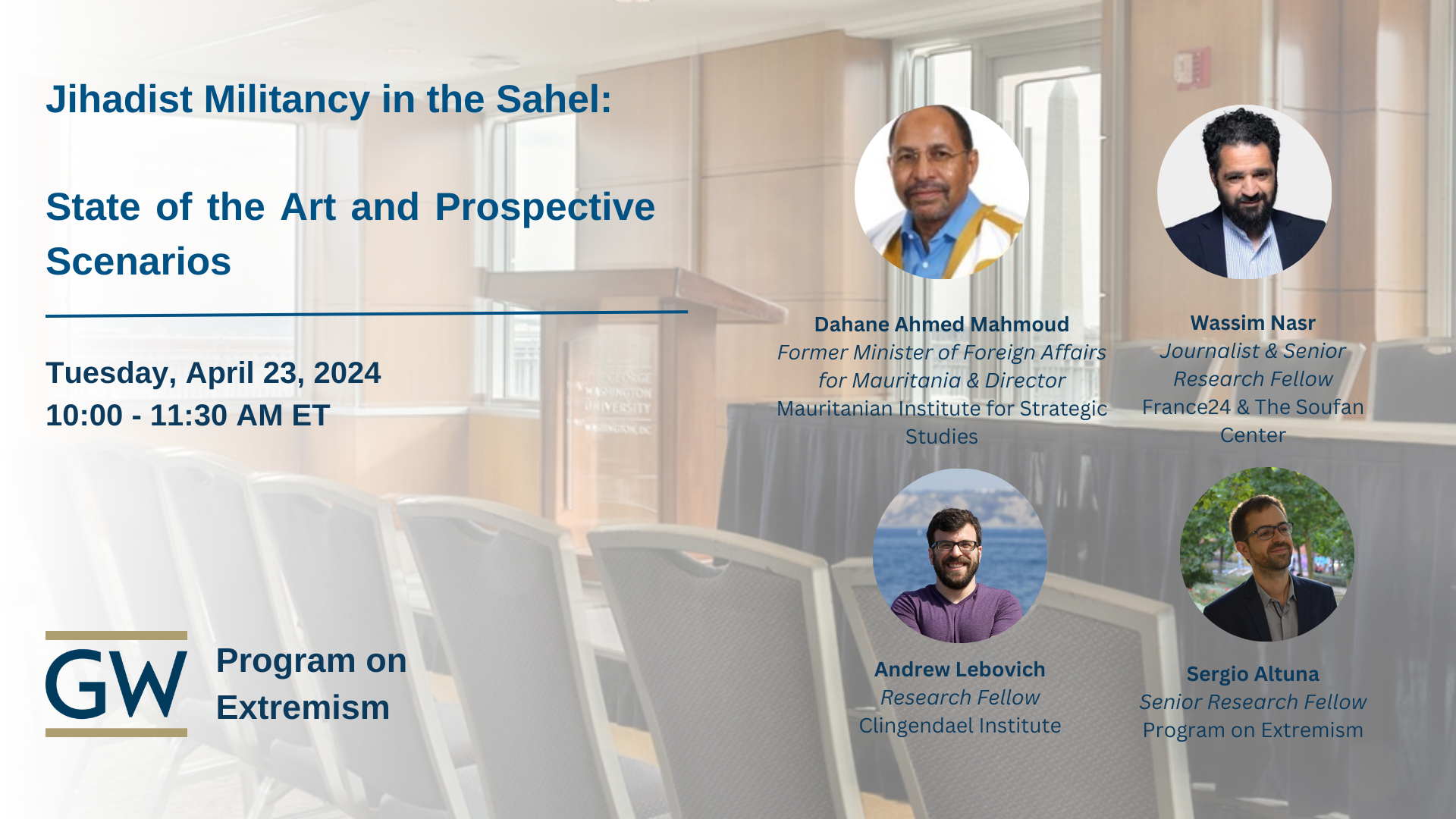Jihadist Militancy in the Sahel: State of the Art and Prospective Scenarios

On April 23, 2024, the Program on Extremism at The George Washington University hosted the first of a series of two online events aimed at examining the situation of jihadism in the Sahel twelve years after militants took control of northern Mali. To do so, the Program hosted an online discussion with a threefold objective: establishing the state of the art among jihadist organizations in the Sahel, explaining why they have substantially grown in size, range of action, capabilities and impact, and finally trying to address the existing challenges and the different plausible scenarios in the region.
In order to discuss these matters, the Program on Extremism was honored to host:
- Mr. Dahane Ahmed Mahmoud, Former Minister of Foreign Affairs for Mauritania, and Director at the Mauritanian Institute for Strategic Studies
- Mr. Wassim Nasr, France24 Journalist and Soufan Center Senior Research Fellow
- Dr. Andrew Lebovich, Research Fellow at the Clingendael Institute
The event was moderated by Program on Extremism Senior Research Fellow Sergio Altuna.
Over two sessions, experts on the Sahel analyzed several concerning trends relating to security and counterterrorism. On April 23rd, panelists discussed jihadist militancy in the Sahel and examined the roles of Al Qaeda and the Islamic State (AQIM) in the region. Although the Jihadist movement can trace a steady presence in the region since as early as 2008, it wasn’t until 2012 when it captured global attention after AQIM succeeded in establishing an Islamic Emirate in northern Mali, leading to a new dynamic in the region and the entrance of jihadist militants in the Sahel. Since then, Jihadist movements in the Sahel have increased their presence and lethality, positioning the region as the current global epicenter of jihadist terrorism. If in 2008 the region accounted for only 1% of global terrorist fatalities, by 2023, that figure had risen to 48%. Examining the roles of Al Qaeda and the Islamic State in the region offers insight into the future of peace in the Sahel.
Former Mauritanian Minister Dahane Ahmed Mahmoud highlighted the violence in the region and the levels at which these states endure this: five of the ten countries most affected by terrorism worldwide in 2023 are in the Sahel while seven of the ten deadliest attacks worldwide also took place in the region. However, it is important to distinguish between the behaviors and activities of Al Qaeda and those of the Islamic State. Wassim Nasr and Andrew Lebovich highlighted the tactics employed by Al Qaeda that help further embed their organization into the region. Specifically, Al Qaeda offers security and protection to communities, as well as structures for justice, which help them garner popular support. Al Qaeda does not force or impose its interpretation of Sharia law onto local communities; instead, communities can receive aid from Al Qaeda so long as they abide by certain rules. Aggressive counterterrorism policies from the government and partnerships with militias caused significant harm to Sahelian communities and contributed to the increasing dependence on Al Qaeda. As Al Qaeda embeds into the culture of countries like Mali, Niger, and Burkina Faso, jihadist violence (from both Al Qaeda and the Islamic State) in the region continues to rise. This is further complicated by a general shift away from cooperation with western states and an increased reliance on Russia and China for security and economic support.
On June 11th, the Program on Extremism approached the Sahel from the perspective of great power competition, hosting an event discussing how the recent breakdown of key bilateral and multilateral security mechanisms in the region alters the strategic landscape. In the wake of coups such as Mali in 2020, Burkina Faso in 2022, and Niger in 2023, the Sahel underwent a pivot away from choosing the West as partners for their security needs. In its place, Russia emerged with replacements for many capabilities traditionally offered by countries such as the United States, France and other partners from the European Union. Ulf Laessing described the success of Russia in the Sahel as being attributable to many reasons; namely, a historical resentment towards colonial powers such as France, the hesitancy of Western countries to interact with countries that have a poor record of human rights, Russian shaping operations in disinformation, and the premature suspension of agreements following coups by organizations such as the European Union that formed the void Russia could fill.
The decision of Sahelian states to break security ties with the West consequently produced concerning results. As outlined by Beatriz de Leon Cobo, the recent history of diplomatic shifts and revisions, fueled by coups d’etat, of Sahelian governments regarding who they consider partners have impacted the security capacity of the region. As a result, states such as Mali, Burkina Faso, and Niger are now unable to adequately respond to insurgencies, combat extremism, and fill the security gap left by Western partners in the wake of withdrawals of thousands of U.S. and French forces in the region. Furthermore, she highlighted concerning developments in other spaces, such as human rights issues and political persecution, which can compound state fragility in an already conflict-prone region.
Despite these challenges, the panel remained optimistic about a path forward. Near the end of the event, Philippe van Amersfoort suggested ways Western countries and multinational organizations should engage Sahelian states post-2023. Specifically, he advocated for the designing of security missions that are reversible, scalable, and more reactive to the new political reality of an unpredictable Sahel. He also examined the power of non-military solutions to security, the use of established partnerships with other organizations Sahelian states are a part of, such as the African Union, and the importance of light-footprint cooperation

